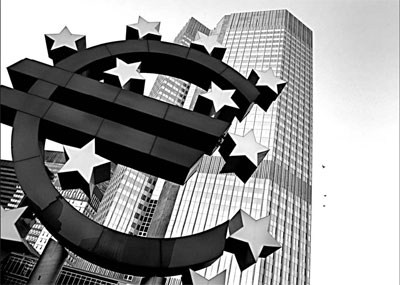ECB faces major tests in the year to come
The European Central Bank starts 2008 with its stature boosted by quick responses to this year's banking crises, but its credibility will be tested soon by money markets, wage demands and a potential housing bust.
"The ECB is beginning 2008 with an enhanced reputation," said Holger Schmiding, chief European economist at Bank of America.
He and others agreed that credibility was a crucial central bank asset, with economist Jennifer McKeown at Capital Economics saying it was "extremely important, and not just in markets but for the general public" as well.
|
The euro currency symbol outside the European Central Bank headquarters in Frankfurt, Germany. Ralph Orlowski/Bloomberg News |
The degree of respect the bank is currently enjoying contrasts with a public pummelling it has taken in the recent past in certain eurozone political and business quarters, notably in France.
The ECB has been faulted for its preoccupation with price stability at the expense of growth, prompting complaints that its tight monetary polices have driven up the value of the euro and dampened eurozone exports.
ECB staff members were ready when a banking crisis erupted in August as the US market for high-risk mortgages collapsed, and the bank moved swiftly and surely to ensure that credit markets threatened by the meltdown continued to function.
Its bold moves earned widespread respect in financial markets, but dangers still lurk ahead, analysts warn.
"The most immediate challenge for the ECB is to deal with the turmoil in the money markets," Schmieding said.
Laurent Bilke at Lehman Brothers added: "The money market turmoil may not remain only a money market problem should it last too long."
The markets remain constrained and could cause bank lending to businesses and individuals to become an issue next year, analysts say.
Even record two-week cash injections on the order of 350 billion euros like one last week have not eased the markets on which banks lend to each other.
Trading dried up as the subprime crisis emerged because banks were unsure if counterparts were credit-worthy owing to unknown losses in securities backed by defaulting high-risk US loans.
ECB President Jean-Claude Trichet told European Union lawmakers last week: "We do not pretend to cure the situation" because the problem lies outside the bank's range of intervention.
It must also deal with a thorny combination of eurozone inflation that has broken above 3 percent and growth that is slowing down amid high prices for oil and other commodities, slumping US activity and a stronger euro that has made exports more expensive.
"Between high inflation and slowing growth, its needs to tread very carefully" noted Julian Jessop, chief international economist at Capital Economics.
As it fights inflation, the bank has warned repeatedly against raising consumer prices and wages in response to the spike in the cost of energy and food products, saying second round increases would create long-term inflation, hurting economic growth and job creation.
Schmieding said that after money market turmoil, "the biggest challenge for the ECB may well be the German wage round," when several unions will press employers for raises of up to 10 percent or more in the case of doctors and train drivers.
Trichet warned last week: "We will not tolerate second round effects," a clear warning the bank could respond by raising its main interest rate, which currently stands at 4 percent.
Elsewhere in Europe meanwhile, housing markets in Spain and Ireland appear to have reached their peak, and while Trichet told EU lawmakers the eurozone sector was expected to ease back slowly, others are less sure.
"A serious correction is clearly possible" in the Spanish construction sector, Schmieding warned.
Spanish or Irish housing problems require different remedies from those applied to core inflation, which might be boosted by German wage demands, he noted, and the ECB will need all the expertise it has gained to steer a steady course.
AFP
(China Daily 12/25/2007 page16)















